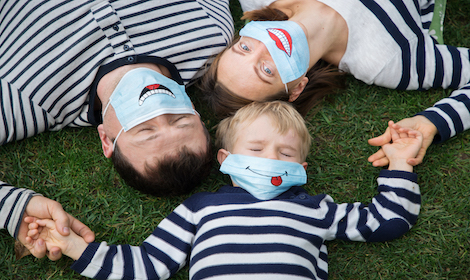Ask an Expert – Tips for Staying Positive and Healthy During the Pandemic

For many people, the pandemic has caused disarray and uncertainty, and it is easy to become anxious and skeptical. However, there are many things we still have control over, and one of those is our attitude. A positive attitude can go a long way in times of stress. Author Charles Swindoll said, “Life is 10% what happens to me and 90% how I react to it.” Consider these tips to stay positive and healthy.
1. Stay connected. Physically distancing does not mean we have to be distanced emotionally or socially. Find creative ways to stay connected to family, friends and coworkers, especially when you feel alone or sense that others might be in need. Ideas to be social while distancing or staying home include:
· Meet up via video conferencing on computers or smartphones. Besides talking and catching up, there are also many fun, entertaining virtual games and activities available.
· Pick up the phone and call loved ones when you think of them.
· Write letters or send cards via email or through the mail. With all the technology available, there is something exciting about receiving a physical letter in the mail.
· Send text messages with funny memes or videos with a note that you are thinking of them.
· Compile a COVID-19 care package and send it to a loved one.
· Make front-porch visits, decorate front doors or draw with sidewalk chalk on a loved one’s driveway or sidewalk.
· Pick your quaran“team” – people who are also limiting social interaction who you can spend time with.
2. Take care of yourself. Fill your cup to foster positivity and resilience. Try positive self-talk, and write down your strengths. Start a gratitude journal. Make a list of your hopes and goals for the future. Reminisce on some of your favorite memories and pastimes. Plan a fun activity or vacation for the future. Other self-care tips include:
· Allow yourself to feel discouraged or to have a melt down every once in awhile. It’s okay.
· Take a break from work and engage in relaxing activities you enjoy.
· Spend time learning a new hobby or creating something.
· Take a break with no expectations of yourself.
· Create a short list of things you can do daily to break up the monotony of at-home routines or feelings of loneliness. Walk the dog for 30 minutes, read a book, cook a new meal for dinner or listen to a favorite podcast or song.
3. With skyrocketing numbers, remember COVID-19 safety.
· Wear a mask anytime you are around people you don’t live with. It’s one of the simplest ways to reduce the spread of COVID-19.
· Wash hands frequently, especially before eating, when returning home, after using the restroom, before leaving your house and after sneezing, coughing or touching your mouth. The CDC has established that washing hands is the number one best way to reduce the spread of germs and disease. In conjunction with masks, it will help reduce the risk of getting COVID-19.
· Stay home if you feel sick. Even if you don’t have COVID-19, being sick can likely mean you have a suppressed immune system, which could make you more susceptible to COVID-19 if you come in contact with it.
· Maintain a 6-foot space between you and others when outside of your home.
· Limit time in stores and other enclosed locations. Use online shopping and curbside pickup when possible.
4. Build and maintain a healthy immune system.
· Get adequate sleep. Most adults need 7 or more hours of sleep per night. Turning off technology at least 30 minutes before bed can improve sleep quality.
· Eat a variety of nutritious foods, including 2 ½ - 3 cups of vegetables a day, whole grain foods, fruits and a variety of plant-based proteins. These contain vitamins and minerals that help the systems in the body work together for better health and minimize the risk of inflammation.
· Stay hydrated by drinking adequate amounts of water each day.
· Exercise regularly for at least 30 minutes a day. In addition to the many health benefits, studies show exercise is one of the most effective ways to manage stress and reduce feelings of anxiety and depression.
By: Melanie Jewkes, Utah State University Extension associate professor, family and consumer sciences, melanie.jewkes@usu.edu
Gabriela Murza, professional practice Extension assistant professor, health and wellness, gabriela.murza@usu.edu


 Utah 4-H & Youth
Utah 4-H & Youth